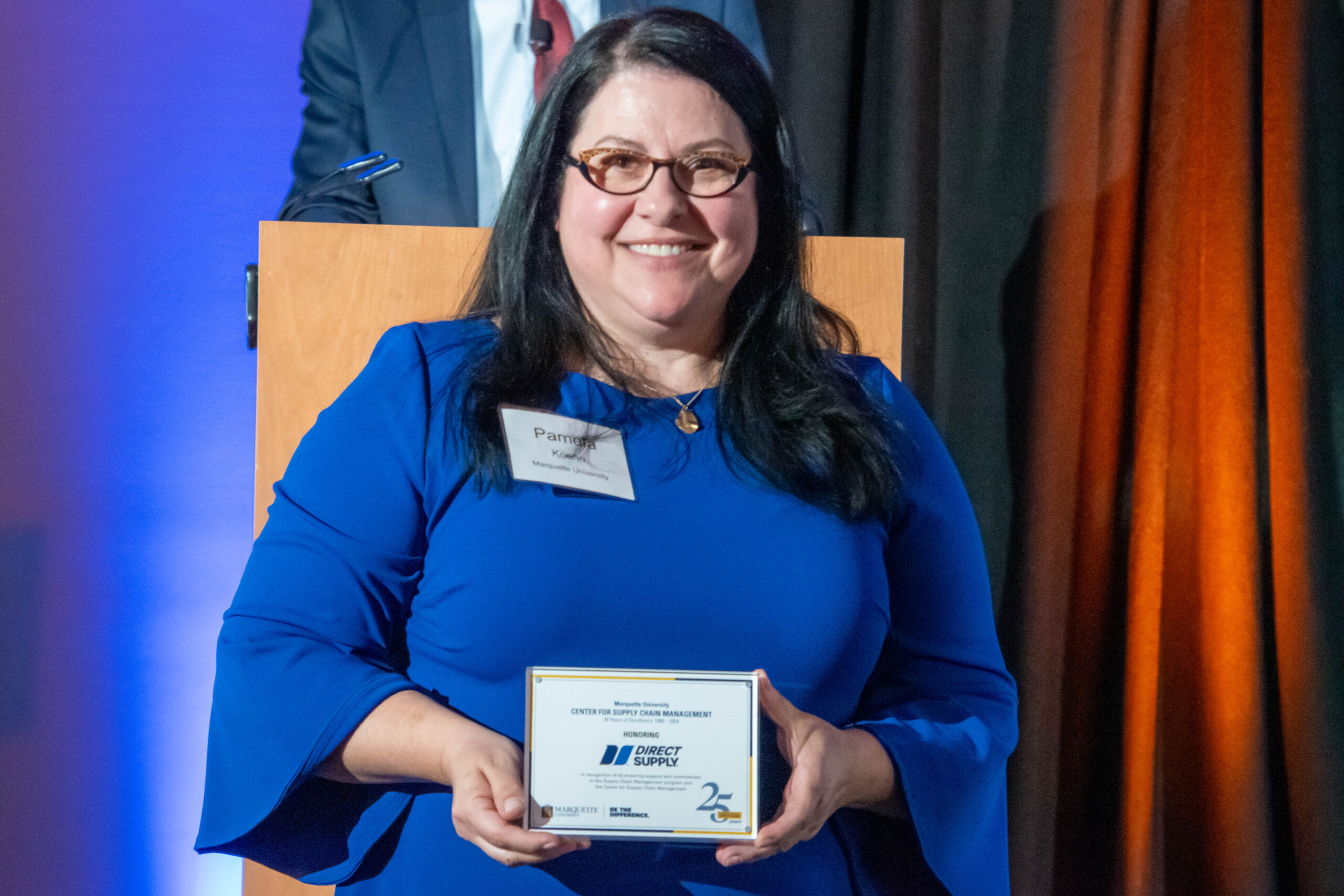Teaching comes naturally to Pamela Koehn.
She embraced her role as an instructor since the first time she developed a course for her team at Direct Supply about negotiations. She hasn’t stopped since.
“The class has evolved over time, but we’ve offered it to our new hires ever since 1997,” Koehn says.
From there, Koehn got involved in classroom instruction through the University of Wisconsin Extension and then Marquette, where she taught undergraduate classes while enrolled as an Executive MBA student. Koehn now teaches leadership courses in that same EMBA program, shaping the career paths of future industry leaders.
Koehn works as vice president of supply chain at Direct Supply when she is not lecturing. She has also owned her own small business and raised two daughters.
What made you want to come to Marquette?
The thing that drew me to Marquette was the opportunity to learn from other professionals in the program. I first became aware of the EMBA program more than two decades ago but did not enroll the first time because I was raising small children and running my own business. When I got a second chance in 2015, I jumped at it.
I’ve always wanted to have a Jesuit education. I looked at several programs, but Marquette stood out because of the curriculum, the faculty and its reputation in the local business community. The opportunity to be part of such a strong alumni group was also a big factor in my decision.
You’ve spent most of your career working in supply chain. Do you think people in that field have an identifiably unique approach to leadership as compared to other business units, e.g., marketing, finance, etc.?
First of all, I think leadership skills really transcend any kind of functional expertise. I’ve been leading people for almost 40 years now and have had the opportunity to do so in a number of areas. That exposure taught me how universally applicable good leadership practice is.
That said, operations and supply chain people really understand the importance of organization and discipline around process. These are really important skills when leading teams through complex situations.
When EMBA students enter your class, where are they generally at in their careers? What are they looking to get out of the course?
Students come into the program at a variety of leadership levels. For some, it’s about making that transfer from tactical work to strategic work. For others, they’ve already traversed that gap but they haven’t had to bring others along with their vision yet.
People in my class are looking for material that will help them understand the journey they’ve gone through so they can hopefully lead others on it as well.
Describe your teaching philosophy.
I see my role as twofold: the presenter of academic work and the facilitator of broad perspectives. My classes are entirely discussion-based. We’ll walk through a topic that they’ve posted online and discussed with one another. We then pull themes out of those discussions and talk about how they’ve experienced some of those in their careers. I want them to explore how they’ve led in the past and then use that information to determine how they eventually want to lead after graduation.
Does anything surprise you about the discussions you have with the students?
They impress me more than surprise me because these are really high-level professionals and I’m not at all surprised at the high level of discussion they bring to class.
The students are very open-minded to different perspectives. While there’s often not agreement in class or on our online discussion posts, there’s always respect and the ability to entertain a different perspective. Exploring hard subjects with students in a safe space and giving them a chance to ponder why they’ve come to the perspective they have is always really interesting.
I understand you were an entrepreneur. What business did you run and how did being a sole proprietor influence your thoughts on leadership?
I had a retail gift shop in Kohler for 13 years.
You really are a jack-of-all-trades when you run your own business, so it was an enriching experience to do that and then step back into Direct Supply with a greater appreciation for the functions around me. I also had a much more solid grasp of what I did well and where I could improve my skills.
Being an entrepreneur taught me to look for the strengths in others. Having diverse perspectives and ways of doing things in the room make us so much better. You learn there are many right ways to look at something when you’re in an unstructured, entrepreneurial environment and I think that’s allowed me to adapt well to the classroom.
If you’re interested in learning more about Graduate School of Management programs, please use this form to request information.



